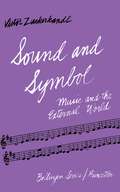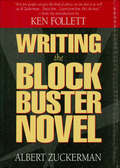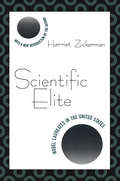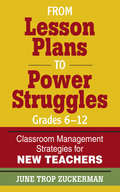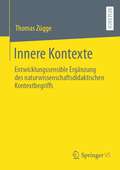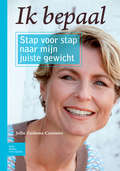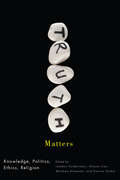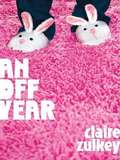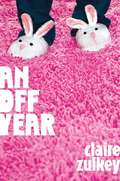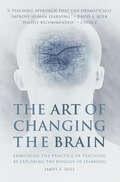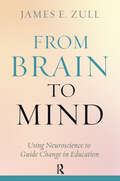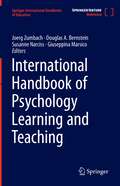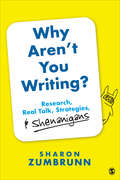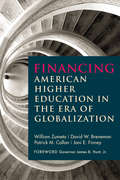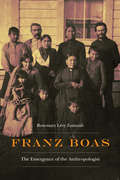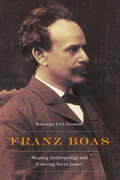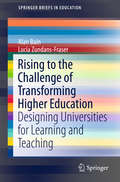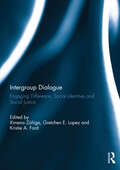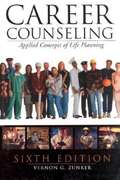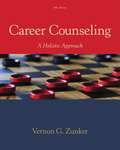- Table View
- List View
Sound and Symbol, Volume 1: Music and the External World (Bollingen Series (General) #655)
by Victor ZuckerkandlAn approach to music as an instrument of philosophical inquiry, seeking not so much a philosophy of music as a philosophy through music.
Writing the Blockbuster Novel
by Al ZuckermanEvery novelist dreams of it--writing the book that rockets to the top of the best-seller lists. Now, they can see how it's done, up close, in a book by an agent who has sold manuscripts that turned into hits.<P><P> Here Albert Zuckerman covers the essential elements of the blockbuster novel and shows writers how to put them to work in their books. Zuckerman covers the subject thoroughly, from creating outlines and building larger than life characters to injecting suspense and more. His instruction is decisive, direct and clear and is supported with examples from Gone With the Wind, The Godfather and other blockbusters.
Scientific Elite: Nobel Laureates in the United States
by Harriet ZuckermanScientific Elite is about Nobel prize winners and the well-defined stratification system in twentieth-century science. It tracks the careers of all American laureates who won prizes from 1907 until 1972, examining the complex interplay of merit and privilege at each stage of their scientific lives and the creation of the ultra-elite in science.The study draws on biographical and bibliographical data on laureates who did their prize-winning research in the United States, and on detailed interviews with forty-one of the fifty-six laureates living in the United States at the time the study was done. Zuckerman finds laureates being successively advantaged as time passes. These advantages are producing growing disparities between the elite and other scientists both in performance and in rewards, which create and maintain a sharply graded stratification system.
From Lesson Plans to Power Struggles, Grades 6–12: Classroom Management Strategies for New Teachers
by June Trop ZuckermanStraight talk about classroom management from new teachers who have developed solutions! Offering authentic stories from novice secondary school teachers in urban, suburban, and rural districts with diverse students, this practical guide illustrates how new teachers can benefit from the experiences of their peers to resolve common classroom challenges. The author provides instructional and disciplinary cases, plus an expert analysis of each teacher’s successful strategies. The book includes: A table of contents with specific instructional/discipline topics for easy reference, Ways to identify when problems are related to lesson delivery or discipline, A glossary of terms and a resource list for detailed information.
Innere Kontexte: Entwicklungssensible Ergänzung des naturwissenschaftsdidaktischen Kontextbegriffs
by Thomas ZüggeDer Kontextbegriff ist in der Naturwissenschaftsdidaktik wohletabliert. Das verleitet zu der Fehlannahme, er sei auch wohldefiniert. In dieser Arbeit wird gezeigt, dass die sehr un- terschiedlichen Verständnisse auch zu unterschiedlichen Zielsetzungen didaktischer Kon- textualisierung im naturwissenschaftlichen Unterricht führen. Die damit verbundenen Deutungen und Funktionen des Begriffs werden in einer Definition zusammengefasst. Dabei wird deutlich, dass die Entwicklung Heranwachsender bisher nicht Teil dessen ist, was didaktisch als Kontext des Unterrichts bezeichnet wird. Die im weiteren Verlauf eingeführte „entwicklungssensible Kontextualisierung“ versteht sich in bewusster Abgrenzung zu anderen diskutierten Ansätzen, die Entwicklungsprozesse Jugendlicher in der Unterrichtsgestaltung abzubilden. Ihre Grundlage sind „innere Kontexte“, deren Charakter aus einer umfangreichen Diskussion des Entwicklungsaufgabenbegriffs in der modernen Entwicklungspsychologie abgeleitet wird.
Ik bepaal
by Jellie Zuidema-CazemierDit boek is voor jou bestemd als je meer dan 5 kilo gewicht wil verliezen en - je voor de eerste keer gaat lijnen - je al vaker hebt gelijnd en weer op je oude gewicht bent teruggekomen of zelfs zwaarder bent geworden - je zoekt naar een manier om je gewicht blijvend omlaag te brengen De inzichten die ik, als ervaren diëtist en docent voedingsleer, eerst met je wil delen zijn: Lijnen op wilskracht alleen werkt niet Een goede voorbereiding is heel belangrijk Kennis is kracht Met kleine veranderingen boek je groot succes Verander alleen iets als je er echt aan toe bent Deze inzichten vormen de sleutel tot succes en de basis voor dit boek. De rest van het boek bestaat uit 46 onderwerpen. Elk onderwerp is een stap op weg naar blijvend gewichtsverlies. Dit lijken misschien veel stappen, maar er zijn dan ook veel verschillende factoren die een rol spelen bij overgewicht en lijnen.
Truth Matters: Knowledge, Politics, Ethics, Religion
by Lambert Zuidervaart Allyson Carr Matthew J. Klaassen Ronnie ShukerWhy should we seek and tell the truth? Does anyone know what truth is? Many are skeptical about the relevance of truth. Truth Matters endeavours to show why truth is important in a world where the very idea of truth is contested. Putting philosophers in conversation with educators, literary scholars, physicists, political theorists, and theologians, Truth Matters ranges across both analytic and continental philosophy and draws on the ideas of thinkers such as Aquinas, Balthasar, Brandom, Davidson, Dooyeweerd, Gadamer, Habermas, Kierkegaard, Plantinga, Ricoeur, and Wolterstorff. Some essays attempt to provide a systematic account of truth, while others wrestle with the question of how truth is told and what it means to live truthfully. Contributors address debates between realists and anti-realists, explore issues surrounding relativism and constructivism in education and the social sciences, examine the politics of truth telling and the ethics of authenticity, and consider various religious perspectives on truth. Most scholars agree that truth is propositional, being expressed in statements that are subject to proof or disproof. This book goes a step farther: yes, propositional truth is important, but truth is more than propositional. To recognize how it is more than propositional is crucial for understanding why truth truly matters. Contributors include Doug Blomberg (ICS), Allyson Carr (ICS), Jeffrey Dudiak (King’s University College), Olaf Ellefson (York University), Gerrit Glas (VU University Amsterdam), Gill K. Goulding (Regis College), Jay Gupta (Mills College), Clarence Joldersma (Calvin College), Matthew J. Klaassen (ICS), John Jung Park (Duke University), Pamela J. Reeve (St. Augustine’s Seminary), Amy Richards (World Affairs Council of Western Michigan), Calvin Seerveld (ICS), Ronnie Shuker (ICS), Adam Smith (Brandeis University), John Van Rys (Redeemer University College), Darren Walhof (Grand Valley State University), Matthew Walhout (Calvin College), and Lambert Zuidervaart (ICS).
AN Off Year
by Claire ZulkeyCecily has always done everything as she was supposed to: taken the right classes, gotten the right grades, applied to the right colleges. But after a lifetime of following the rules, she surprises everyone by arriving for her freshman year of college . . . and turning around. There are infinite possibilities for Cecily's unexpected gap year. She could volunteer, or travel around the world - but, for now, Cecily is content to do absolutely nothing. What follows is a year of snarkily observed self-doubt and selfdiscovery during which Cecily must ask herself, for the first time, what does she really want to do with her life?
An Off Year
by Claire ZulkeyCecily has always done everything as she was supposed to: taken the right classes, gotten the right grades, applied to the right colleges.
The Art of Changing the Brain: Enriching the Practice of Teaching by Exploring the Biology of Learning
by James E. ZullNeuroscience tells us that the products of the mind--thought, emotions, artistic creation--are the result of the interactions of the biological brain with our senses and the physical world: in short, that thinking and learning are the products of a biological process.This realization, that learning actually alters the brain by changing the number and strength of synapses, offers a powerful foundation for rethinking teaching practice and one's philosophy of teaching.James Zull invites teachers in higher education or any other setting to accompany him in his exploration of what scientists can tell us about the brain and to discover how this knowledge can influence the practice of teaching. He describes the brain in clear non-technical language and an engaging conversational tone, highlighting its functions and parts and how they interact, and always relating them to the real world of the classroom and his own evolution as a teacher. "The Art of Changing the Brain" is grounded in the practicalities and challenges of creating effective opportunities for deep and lasting learning, and of dealing with students as unique learners.
From Brain to Mind: Using Neuroscience to Guide Change in Education
by James E. ZullFinalist for Foreword Magazine's 2011 Book of the YearWith his knack for making science intelligible for the layman, and his ability to illuminate scientific concepts through analogy and reference to personal experience, James Zull offers the reader an engrossing and coherent introduction to what neuroscience can tell us about cognitive development through experience, and its implications for education.Stating that educational change is underway and that the time is ripe to recognize that “the primary objective of education is to understand human learning” and that “all other objectives depend on achieving this understanding”, James Zull challenges the reader to focus on this purpose, first for her or himself, and then for those for whose learning they are responsible. The book is addressed to all learners and educators – to the reader as self-educator embarked on the journey of lifelong learning, to the reader as parent, and to readers who are educators in schools or university settings, as well as mentors and trainers in the workplace.In this work, James Zull presents cognitive development as a journey taken by the brain, from an organ of organized cells, blood vessels, and chemicals at birth, through its shaping by experience and environment into potentially to the most powerful and exquisite force in the universe, the human mind.Zull begins his journey with sensory-motor learning, and how that leads to discovery, and discovery to emotion. He then describes how deeper learning develops, how symbolic systems such as language and numbers emerge as tools for thought, how memory builds a knowledge base, and how memory is then used to create ideas and solve problems. Along the way he prompts us to think of new ways to shape educational experiences from early in life through adulthood, informed by the insight that metacognition lies at the root of all learning.At a time when we can expect to change jobs and careers frequently during our lifetime, when technology is changing society at break-neck speed, and we have instant access to almost infinite information and opinion, he argues that self-knowledge, awareness of how and why we think as we do, and the ability to adapt and learn, are critical to our survival as individuals; and that the transformation of education, in the light of all this and what neuroscience can tell us, is a key element in future development of healthy and productive societies.
Haunted Schools: True Ghost Stories
by Allan ZulloNine stories about ghosts and phantoms found haunting schools.
Haunted Schools: True Ghost Stories
by Allan ZulloIs Your School Haunted? A strange girl who shows up at a school is not what she appears to be . . . students find a shocking secret in their school's theater, an empty school vibrates with the laughter of unseen children; In this spine tingling book, these and other true ghost stories that happen in schools just like yours.
International Handbook of Psychology Learning and Teaching (Springer International Handbooks of Education)
by Joerg Zumbach Douglas A. Bernstein Susanne Narciss Giuseppina MarsicoThe International Handbook of Psychology Learning and Teaching is a reference work for psychology learning and teaching worldwide that takes a multi-faceted approach and includes national, international, and intercultural perspectives. Whether readers are interested in the basics of how and what to teach, in training psychology teachers, in taking steps to improve their own teaching, or in planning or implementing research on psychology learning and teaching, this handbook will provide an excellent place to start. Chapters address ideas, issues, and innovations in the teaching of all psychology courses, whether offered in psychology programs or as part of curricula in other disciplines. The book also presents reviews of relevant literature and best practices related to everything from the basics of course organization to the use of teaching technology. Three major sections consisting of several chapters each address “Teaching Psychology in Tertiary (Higher) Education”, “Psychology Learning and Teaching for All Audiences”, and “General Educational and Instructional Approaches to Psychology Learning and Teaching”.
Why Aren’t You Writing?: Research, Real Talk, Strategies, & Shenanigans
by Sharon K. ZumbrunnWrite more with less pain! Why Aren’t You Writing?: Research, Real Talk, Strategies, & Shenanigans describes research on how bright and otherwise fairly normal people lose their minds when it comes to writing, and then shows the reader how to stop being one of those people. Author Sharon Zumbrunn designed this brief text for beginning and struggling academic writers so they can understand the psychological hang-ups that can get in the way of productivity. This book intertwines social and behavioral science research and humor to offer tips and exercises to help writers overcome their hurdles. Each chapter includes a description of findings from psychological and related research on writing hurdles and personal experiences of the writing process. Within the chapters, the author provides practical strategies and resources to help writers move beyond the challenges holding them back. Why Aren′t You Writing? acknowledges how emotionally and mentally challenging it can be to be a "writer." This book helps readers to balance the hard work required for change with a bit of levity often necessary for withstanding sustained difficult thinking and meaningful change. Together, the components of this text present a systematic approach for beginning and struggling academics to become aware of what might be happening in their heads when they (don’t) write, and harness that knowledge to build a healthier and more resilient relationship with writing.
Why Aren’t You Writing?: Research, Real Talk, Strategies, & Shenanigans
by Sharon K. ZumbrunnWrite more with less pain! Why Aren’t You Writing?: Research, Real Talk, Strategies, & Shenanigans describes research on how bright and otherwise fairly normal people lose their minds when it comes to writing, and then shows the reader how to stop being one of those people. Author Sharon Zumbrunn designed this brief text for beginning and struggling academic writers so they can understand the psychological hang-ups that can get in the way of productivity. This book intertwines social and behavioral science research and humor to offer tips and exercises to help writers overcome their hurdles. Each chapter includes a description of findings from psychological and related research on writing hurdles and personal experiences of the writing process. Within the chapters, the author provides practical strategies and resources to help writers move beyond the challenges holding them back. Why Aren′t You Writing? acknowledges how emotionally and mentally challenging it can be to be a "writer." This book helps readers to balance the hard work required for change with a bit of levity often necessary for withstanding sustained difficult thinking and meaningful change. Together, the components of this text present a systematic approach for beginning and struggling academics to become aware of what might be happening in their heads when they (don’t) write, and harness that knowledge to build a healthier and more resilient relationship with writing.
Financing American Higher Education in the Era of Globalization
by William Zumeta David W. Breneman Patrick M. Callan Joni E. FinneyThis ambitious book grows out of the realization that a convergence of economic, demographic, and political forces in the early twenty-first century requires a fundamental reexamination of the financing of American higher education. The authors identify and address basic issues and trends that cut across the sectors of higher education, focusing on such questions as how much higher education the country needs for individual opportunity and for economic viability in the future; how responsibility for paying for it is currently allocated; and how financing higher education should be addressed in the future.
Franz Boas: The Emergence of the Anthropologist (Critical Studies in the History of Anthropology)
by Rosemary Lévy ZumwaltRosemary Lévy Zumwalt tells the remarkable story of Franz Boas, one of the leading scholars and public intellectuals of the late nineteenth and early twentieth centuries. The first book in a two-part biography, Franz Boas begins with the anthropologist’s birth in Minden, Germany, in 1858 and ends with his resignation from the American Museum of Natural History in 1906, while also examining his role in training professional anthropologists from his berth at Columbia University in New York City. Zumwalt follows the stepping-stones that led Boas to his vision of anthropology as a four-field discipline, a journey demonstrating especially his tenacity to succeed, the passions that animated his life, and the toll that the professional struggle took on him. Zumwalt guides the reader through Boas’s childhood and university education, describes his joy at finding the great love of his life, Marie Krackowizer, traces his 1883 trip to Baffin Land, and recounts his efforts to find employment in the United States. A central interest in the book is Boas’s widely influential publications on cultural relativism and issues of race, particularly his book The Mind of Primitive Man (1911), which reshaped anthropology, the social sciences, and public debates about the problem of racism in American society.Franz Boas presents the remarkable life story of an American intellectual giant as told in his own words through his unpublished letters, diaries, and field notes. Zumwalt weaves together the strands of the personal and the professional to reveal Boas’s love for his family and for the discipline of anthropology as he shaped it.
Franz Boas: Shaping Anthropology and Fostering Social Justice (Critical Studies in the History of Anthropology)
by Rosemary Lévy ZumwaltFranz Boas defined the concept of cultural relativism and reoriented the humanities and social sciences away from race science toward an antiracist and anticolonialist understanding of human biology and culture. Franz Boas: Shaping Anthropology and Fostering Social Justice is the second volume in Rosemary Lévy Zumwalt&’s two-part biography of the renowned anthropologist and public intellectual. Zumwalt takes the reader through the most vital period in the development of Americanist anthropology and Boas&’s rise to dominance in the subfields of cultural anthropology, physical anthropology, ethnography, and linguistics. Boas&’s emergence as a prominent public intellectual, particularly his opposition to U.S. entry into World War I, reveals his struggle against the forces of nativism, racial hatred, ethnic chauvinism, scientific racism, and uncritical nationalism. Boas was instrumental in the American cultural renaissance of the 1920s and 1930s, training students and influencing colleagues such as Melville Herskovits, Zora Neale Hurston, Benjamin Botkin, Alan Lomax, Langston Hughes, and others involved in combating racism and the flourishing Harlem Renaissance. He assisted German and European émigré intellectuals fleeing Nazi Germany to relocate in the United States and was instrumental in organizing the denunciation of Nazi racial science and American eugenics. At the end of his career Boas guided a network of former student anthropologists, who spread across the country to university departments, museums, and government agencies, imprinting his social science more broadly in the world of learned knowledge.Franz Boas is a magisterial biography of Franz Boas and his influence in shaping not only anthropology but also the sciences, humanities, social science, visual and performing arts, and America&’s public sphere during a period of great global upheaval and democratic and social struggle.
Rising to the Challenge of Transforming Higher Education
by Lucia Zundans-Fraser Alan BainCreating a successful and distinctive approach to learning and teaching at scale is a challenge facing all universities. This brief presents the Self-Organizing University (SOU), a transformational whole-of-organization solution for the design, delivery, and evaluation of learning and teaching in all its forms. It describes the elements of the SOU approach along with the implementation process and expected outcomes. It also explains the rationale and research base for each element of the model and how they are connected to create a university-wide model of learning and teaching. It includes guidance for anyone responsible for institutional improvement in the learning and teaching space.
Intergroup Dialogue: Engaging Difference, Social Identities and Social Justice
by Ximena Zúñiga Gretchen E. Lopez Kristie A. FordIntergroup dialogue is a form of democratic engagement that fosters communication, critical reflection, and collaborative action across social and cultural divides. Engaging social identities is central to this approach. In recent years, intergroup dialogue has emerged as a promising social justice education practice that addresses pressing issues in higher education, school and community settings. This edited volume provides a thoughtful and comprehensive overview of intergroup dialogue spanning conceptual frameworks for practice, and most notably a diverse set of research studies which examine in detail the processes and learning that take place through dialogue.This book addresses questions from the fields of education, social psychology, sociology, and social work, offering specific recommendations and examples related to curriculum and pedagogy. Furthermore, it contributes to an understanding of how to constructively engage students and others in education about difference, identities, and social justice.This book was originally published as a special issue of Equity & Excellence in Education.
Career Counseling: Applied Concepts Of Life Planning
by Vernon G. ZunkerThis successful and popular book has been completely updated to give you the most recent information on emerging theories, recent research, and current computer-assisted guidance programs in career counseling! Whether you are a counselor or a counselor-in-training, you'll appreciate the way Vernon Zunker presents practical techniques and real-life examples as he patiently helps you understand the theoretical models of career counseling and how to effectively counsel clients about career issues. In the Sixth Edition, you'll find Zunker's clear writing style and interesting exercises, as well as: *Five career counseling models with case illustrations *A new Chapter 8, "Self-Assessment and a Model for Using Assessment," which discusses the rationale for using self-assessment tools *A new Chapter 15, "Career Counseling for Gay, Lesbian, and Bisexual Clients," which helps familiarize you with the issues and needs of this client population *Theories of career development and counseling models-summarized in tables to help you study and prepare for the licensing examination *Web site information that points you to additional, reliable information online *And much more!
Career Counseling: A Holistic Approach
by Vernon G. Zunker<P>Providing the most current, comprehensive coverage available, CAREER COUNSELING: A HOLISTIC APPROACH, 9th Edition equips students with a solid understanding of the theoretical models of career counseling and practical techniques on how to effectively counsel clients about career issues.<P> Presenting the subject matter in a way that is relevant to all counseling students, Vernon Zunker uses an innovative holistic or “whole person” approach, demonstrating how to consider values, temperament, talents, and passions when integrating career with personal counseling to determine a client's best career fit.<P> The thoroughly revised and updated Ninth Edition of this classic book includes chapters on integrating career and personal counseling, job loss and transitions, adult career development, and career-related programs in middle schools.<P> In addition, diversity issues are integrated throughout, while relevant case studies bring chapter concepts to life. The text is also packed with tools to help students maximize their success in class and on the licensing exam.
